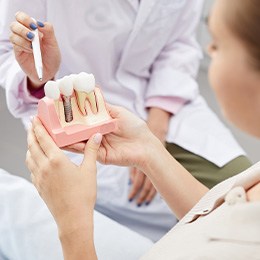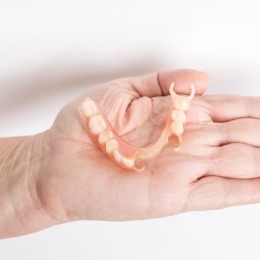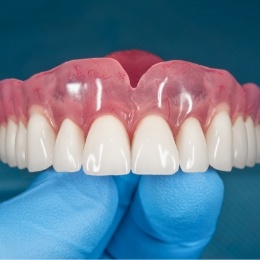Dentures – Nepean, ON
Reliable, Durable, and Natural-Looking Replacement Teeth

When you think about dentures, you might envision those that your grandmother or grandfather wore. Although the goal of these dental prosthetics remains the same – to replicate smiles and offer greater function by replacing missing teeth – the materials used to create dentures now allow for more pleasing aesthetics while also delivering greater durability. At Nepean Dental Centre, Dr. Bal is pleased to work with you to establish your unique needs and deliver high-quality teeth that make life much more enjoyable. Call us if you are ready to take the next step in your smile journey by replacing your missing teeth with dentures in Nepean.
Why Choose Nepean Dental Centre for Dentures?
- High-Quality Dental Materials Used
- Innovative Dental Technology for Enhanced Images
- Partnered with Trusted Dental Labs to Ensure Optimal Results
Who's a Good Candidate for Dentures?

If you are missing several teeth or you’ve lost all of them, then you may be considering dentures. After all, this tried-and-true tooth-replacement solution is great at replacing a large number of missing teeth. Fortunately, their versatility and life-like appearance make them a great option for a wide range of patients! So, don’t hesitate to schedule an appointment with us if you are ready to explore your treatment options. You can also read on to learn more, including the negative effects of missing teeth.
Effects of Missing Teeth

Many patients assume that missing teeth is just a cosmetic concern. That’s not the case! The reality is that even one missing tooth can restrict your diet, leading to nutrient deficiencies and indigestion. Plus, it won’t take long for the teeth surrounding the gap to move out of alignment, negatively impacting your bite further. In other words, even minor cases of tooth loss can take a serious toll on the look, health, and function of your smile, so the best thing to do is explore your treatment options before that happens.
What Qualifies You for Dentures?

If you’re unsure whether you are a candidate for dentures, the first step to take is to schedule an appointment with Dr. Bal. It is during this visit that he will evaluate your smile and take images of your teeth, gums, and jawbone. From there, he can review the different types of dentures and help you decide which one is best for you. For example, if you are missing several teeth in a row, a partial denture will help you to smile again. If you’re missing an entire arch of teeth, on the other hand, then a full denture is ideal.
Alternative Tooth-Replacement Options

Of course, dentures aren’t the only way we can restore the look, health, and function of your smile. If your jawbone is dense enough, your oral and overall health are in good shape, and you don’t smoke, then we may recommend dental implants instead! Not only are they lifelike in look and feel, but they are the only solution that replaces both the root and crown. Plus, they can last for 15+ years with the right best practices in place.
Rest assured, we will cover all of this and more with you at your consultation. That way, you have all of the information you need to decide how you want to restore your smile.
The Types of Dentures

When discussing tooth replacement solutions, three are currently available: partial dentures, full dentures, and implant dentures.
- Partial Denture – Much like a puzzle piece that fits perfectly into place, a partial denture fills in the gaps. With metal clasps that attach to regular teeth, this unique design blends real and artificial teeth so that no one will ever know the difference.
- Full Denture – Similar to a partial, full dentures do not require metal clasps but instead natural suction. Using the same acrylic base and artificial teeth as partials, these prosthetics replace entire arches of missing teeth, delivering fully restored appearances.
- Implant Dentures – While the denture itself is much like its traditional counterpart, the way it attaches is vastly different. Instead of relying on suction and denture adhesive, implant dentures are secured to four to six titanium posts that are surgically placed within the jawbone, creating a permanent foundation for your smile.
Implant Dentures

If permanence is what you’re looking to achieve, implant dentures can deliver. As part of a multi-step process, these titanium posts look and act like tooth roots helping to stimulate the jawbone and fuse with surrounding tissues to create a firm, solid, and permanent base for customized restorations.
Minor oral surgery is required to place the dental implants, but after thorough healing, a full or partial denture is attached to not only help improve your appearance, but also restore most of your bite force and chewing power. This means that you are free to eat the foods you love.
Yu’ll also enjoy the positive impact your new teeth have on your mental, emotional, and physical health – all factors that can help to improve your overall well-being.
Denture FAQs
What is the Average Age for Dentures?
Age impacts your body in many ways, and your smile is no exception. Tooth loss occurs more frequently as you get older because your enamel and connective tissues weaken over time, leaving your teeth without the firm foundation required to keep them in place. As a result, about 66% of adults who are between 40 and 64 years old are missing at least one tooth, while only about 33% of people aged 20 to 39 can say the same.
However, tooth loss can also be caused by other contributing factors, like genetics and physical trauma, that impact patients of all ages. Thankfully, there’s no age requirement for getting dentures. Dr. Bal is happy to provide lifelike restorations to rebuild your grin regardless of how old you are.
Can I Sleep with My Dentures In?
If you’ve only recently received your dentures, you might have questions about how to care for them. For example, many patients wonder if it’s safe to sleep with their dentures still in their mouths.
While this might be acceptable every now and then, it’s generally not recommended. Your prosthetics rely on a firm suction against your gum tissues to remain put all day, which reduces their circulation. As a result, your body can’t deliver essential nutrients and infection-fighting cells to your teeth and gums, increasing the risk of periodontal problems.
It’s better to place your new teeth in a glass of water or a special cleaning solution to kill germs and maintain their shape at night while you sleep.
Is it Hard to Talk with Dentures?
Many patients near Nepean who experienced alterations in their speech patterns due to tooth loss wonder whether getting dentures will help or hinder their ability to communicate. It often takes about a month for your tongue and the other supporting muscles in your mouth to fully adjust to your restoration, and it’s not uncommon to develop a slight slur or lisp during that time.
Thankfully, the effect is usually temporary and can be overcome with enough patience and practice. You can speed up the process by reading aloud to yourself at home or recording yourself, allowing you to rehearse troublesome words and sounds until you feel confident in your ability to express yourself clearly.
What Can’t You Eat with Dentures?
Your new teeth return a good portion of your original bite force so you can enjoy a wider variety of wholesome foods to support your oral and overall health. However, some common culprits can hurt your dentures if you’re not careful.
For instance, hard foods like popcorn, nuts, and seeds can chip or crack your restoration while overly sticky foods, like taffy or candy, can yank them out of position and cause harm. You should blend or cook fruits and vegetables to avoid biting into them raw, and tough selections of meat should be cut into smaller pieces that can be more easily chewed and swallowed.
